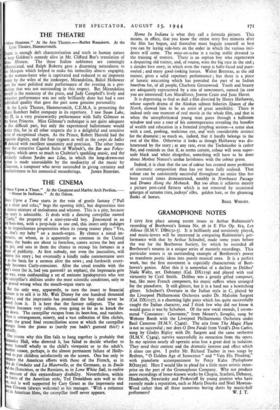GRAMOPHONE NOTES
I GIVE first place among recent issues to Arthur Rubinstein's recording of Beethoven's Sonata No. 26 in E Flat Op. 8ra, Les Adieux (H.M.V. DB6132-3). It is brilliantly and sensitively played, and music-lovers will be interested in comparing Rubinstein's per- formance with that by Arthur Schnabel, made some years before the war for the Beethoven Society, for which he recorded all Beethoven's sonatas in a unique series of masterly recordings. This particular sonata is an outstanding example of Beethoven's power to transform poetic ideas into purely musical ones. It is a perfect work, but the first movement is especially characteristic of Beet- hoven's genius. After this it is somewhat of a decline to Delibes' Naila Waltz, arr. Dohnanyi (Col. DX1159) and played with real virtuosity by Cyril Smith. Delibes was a greatly gifted composer, but, like most French composers, his music suffers when arranged for the pianoforte. It still glitters, but it is a hard not a bewitching glitter. Schubert's Overture in the Italian style in C, played by the Liverpool Philharmonic Orchestra under Dr. Malcolm Sargent (Col. DX1157), is a charming light piece which has quite successfully caught the Italian character, and I think few who did not know it would guess it was by Schubert. Of the new vocal records, I recom- mend " Constanze Constanze," from Mozart's Seraglio, sung by Webster Booth with the Liverpool Philharmonic Orchestra under Basil Cameron (H.M.V. C34o2). The aria from The Magic Flute is not so successful ; nor does 0 Don Fatale from Verdi's Don Carlos, sung by Gladys Ripley with Dr. Sargent and the same orchestra (H.M.V. C34o4), survive successfully its extraction from the opera. In my opinion nearly all operatic arias lose a great deal in isolation. They need their context and the dramatic interest and effect which it alone can give. I prefer Mr. Richard Tauber in two songs by Brahms, "0 Golden Age of Innocence" and "Vain His Pleading," with pianoforte accompaniment by Percy Kahn (Parlophone R02o53o). Here I would like to plead for a little more artistic enter- prise on the part of the Gramophone Company. Why not produce more recordings of lesser-known works by Chopin, Scarlatti, Debussy, Hindemith, Stravinsky and Prokovieff by young pianists who have recently made a reputation, such as Maria Douska and Noel Mewton- Wood rather than all these numerous boring duets by music-hall


























 Previous page
Previous page